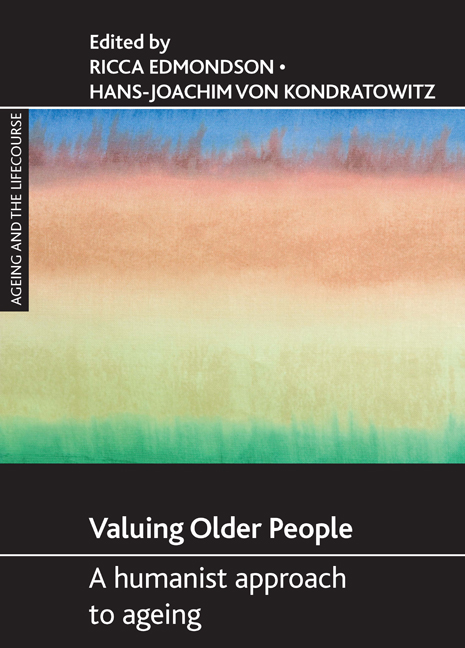Book contents
- Frontmatter
- Contents
- List of tables and figures
- Notes on contributors
- Acknowledgements
- Foreword
- Introduction
- Part One Religion, spirituality, cultural resources and creating meaning
- Part Two Norms, values and gerontology
- Part Three Ageing and wisdom? Conflicts and contested developments
- Afterwords
- Index
- Available titles in the Ageing and the Lifecourse series
seventeen - Gateways to humanistic gerontology
Published online by Cambridge University Press: 05 July 2022
- Frontmatter
- Contents
- List of tables and figures
- Notes on contributors
- Acknowledgements
- Foreword
- Introduction
- Part One Religion, spirituality, cultural resources and creating meaning
- Part Two Norms, values and gerontology
- Part Three Ageing and wisdom? Conflicts and contested developments
- Afterwords
- Index
- Available titles in the Ageing and the Lifecourse series
Summary
The contributors to this fine volume on humanistic gerontology come from a broad array of fields and quite a number of countries and languages of origin. For most, the study of ageing was not the focus of their formal education. Something must have lured them into the realm of the ageing – a favourite grandparent, an opportune moment for a dissertation topic, grant money to research one of the ‘challenges’ faced by older adults, or possibly an intriguing aged character in a novel, such as the ‘ancient clerk’ Mr Chuffy in Dickens's Martin Chuzzlewit.
Whichever gate they have traversed, once humanistic scholars enter the land of older people they are bound to encounter familiar faces – their own. That's when the fun begins. For here is a hermeneutic circle or set of concentric circles through which, by virtue of the scholar's own ageing process, he or she moves ever closer towards the centre. As the scholar attempts a deeper understanding of what it means to grow old, he or she must struggle with the problem of finding a suitable framework – one that includes the student of ageing as well as the subjects.
My first gateway beckoned to me in the autumn of 1976 as I planned to offer a course on philosophers’ autobiographies at a senior centre in Olympia, Washington. I was just then teaching at a highly innovative undergraduate college nearby and had my students reading John Stuart Mill's (and likely his co-author in shadows, Harriet Taylor’s) famous essay on The subjection of women (Mill, 1869). In this fiery critique of ‘The legal subordination of one sex to the other’, Mill says of women's character, ‘we do not yet know who they are’. Given the social conditions of inequality with respect to suffrage, divorce and property law (not to mention access to independent careers), women's development had been severely restricted to the degree that their true merit and contributive powers were as yet unknown. Mill was not a great believer in arguments ‘from nature’ as he was also an ardent critic of arguments from religious revelation or church authority in general. Yes, he was a man of reason, though he tipped his hat to the life of feelings.
My first reaction to my small and educationally and socioeconomically eclectic senior centre group was right out of the Mill/Taylor essay. Of older people, I thought to myself, given the pervasive stereotypes (my own included), social messages encouraging older people to disengage from both work and social life, and beliefs about ageing as a disease, we do not know who they are.
- Type
- Chapter
- Information
- Valuing Older PeopleA Humanist Approach to Ageing, pp. 283 - 288Publisher: Bristol University PressPrint publication year: 2009

